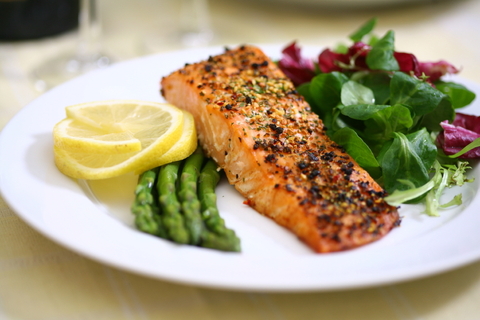 Anti-inflammatory is becoming a huge buzz word these days as more and more data is becoming available that inflammation is one of the driving forces behind weight loss resistance, chronic illness, heart disease, obesity, cancer, and autoimmune diseases-just to name a few. This week we've dedicated our What's That?! Wednesday post to a topic that has been my personal focus of study for the last few years...the Anti-Inflammatory Diet... What is Inflammation? Inflammation is our body's protective and healing response to injury or invasion. The type of inflammation that we all know and can relate to includes pain, swelling, redness, heat, and fever. But when inflammation persists and/or the immune system becomes 'overactive,' it can damage the body and cause illness not only acutely, but also slowly and silently over time. The main causes of inflammation in our bodies are: disease (pathogens, bacteria, virus, fungus, etc), excess adipose/fat tissue, genetics, smoking, stress, environmental toxins, and FOOD! The foods that have been shown to increase inflammatory responses include: refined carbohydrates, sugars, most processed and pre-packaged foods, trans fats, non-organic produce, grain fed animal protein, and often gluten, dairy, and soy. What Are the Benefits of an Anti-Inflammatory Diet?
What Do You Eat on an Anti-Inflammatory Diet? An anti-inflammatory eating plan places an emphasis on eating organic vegetables, healthy fat, and protein first and then incorporates some healthy carbohydrates in appropriate amounts occasionally. Specifically:
Is the Paleo Diet an Anti-Inflammatory Diet? Yes. The paleo diet is being hailed as an amazing anti-inflammatory diet, specifically suggested for weight loss and those suffering from autoimmune conditions and some chronic illnesses. While Jennifer and I both agree with many of the elements of this diet, we do not advocate going full paleo for a long period of time. Based on our research and experience with clients, we see that low-carb diets can be difficult for people to stick to and often increase cravings for sweets and carbs, especially at night. We like people to feel successful and not feel like they are being deprived. Additionally, one of the key hormones that drives energy and weight loss is cortisol and eating a low carb diet can actually increase cortisol production which keep your body in fight or flight mode. This basically instructs your body to store fat and not burn it. While the science behind the paleo diet says that your body prefers to use fat as fuel and that carbohydrates are not necessary, we've found that most people need a little bit of healthy carbohydrates to find the right balance of energy and satiety. In addition, the brain and nervous system rely entirely on carbohydrates to function, and if they have to convert them from protein or fat in the body since there is no available food source, this can lead to feelings of 'fogginess' and mental unclarity. A small amount of healthy, clean carbs helps you to stay mentally sharp. Why Choose an Anti-Inflammatory Diet - A Personal Story: As someone who has personally suffered from chronic, systemic inflammation due to Lyme disease for the last decade of my life, I cannot emphasize enough how much implementing an anti-inflammatory eating plan has improved my life. I was a yo-yo dieter for years living on "diet foods" and always thinking that the calorie counting and "eat less, exercise more" approach was the only way to look at things. As I got older and my disease progressed, I found that this strategy often left me hungry, with increased cravings for bad foods, decreased energy, increased mood swings, and increased pain and other adverse symptoms. I also found that it was tougher and tougher to maintain a healthy weight. Almost four years ago I went through a detox diet and then implemented an anti-inflammatory eating plan and within a couple of months my lifelong IBS issues went away, the extra pounds dropped off, my muscle tone and energy improved, my hormones and mood came into better balance, and I found some pain relief from my debilitating Lyme symptoms. I encourage anyone who is battling a chronic illness, especially an autoimmune condition, chronic infection, chronic allergies, or diabetes to work with a specialist to implement an anti-inflammatory eating plan. As I mentioned, I've spent much of the last several years studying and learning anti-inflammatory diet protocols and we've taken the best parts of each of those protocols and made them available to you in our Anti-Inflammatory Diet Menu. This eating plan incorporates elements of the paleo diet, the zone diet, anti-candida and digestive repair protocols, the raw diet, and general anti-inflammatory protocols. It is great for anyone who is sick of yo-yo dieting, wants to lose weight and keep it off, or is living with or trying to recover from a chronic illness or autoimmune disease. Click here to see the details of this eating plan and to get started. In Good Health! ~Billie & Jennifer
2 Comments
Thank you for sharing this very informative content I read a lot of importance's to live longer by taking self care by drinking food supplements daily. I also recommend Haarlem Oil made from France. It can help to boost your immune system to fight against viruses and infections.
Reply
9/9/2021 11:26:13 pm
Thank you for sharing this very informative content I read a lot of importance's to live longer by taking self care by drinking food supplements daily. I also recommend Haarlem Oil made from France. It can help to boost your immune system to fight against viruses.
Reply
Leave a Reply. |
Billie Shellist, FDN-P
I practice functional nutrition, an approach that allows me to look at your entire health history and help you find the "root causes" of your chronic health complaints. This cuts out the trial and error process and helps you get real symptom relief and resolution! Food is medicine and knowledge is power -I hope you enjoy my anti-inflammatory recipes which are gluten, dairy, and soy free as well as very low grain and sugar. If you'd like to heal from the root cause(s) of your chronic symptoms, try starting with a complimentary 15-minute consultation. Click here to request your free session. |

